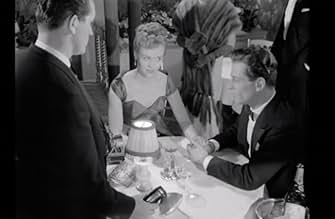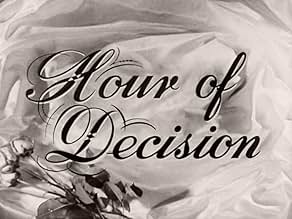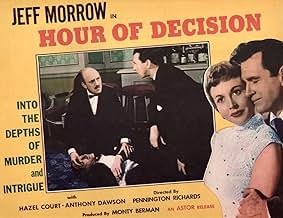Füge eine Handlung in deiner Sprache hinzuAn American journalist solves the mystery of an unpleasant columnist's murder and clears his own wife, one of the many suspects.An American journalist solves the mystery of an unpleasant columnist's murder and clears his own wife, one of the many suspects.An American journalist solves the mystery of an unpleasant columnist's murder and clears his own wife, one of the many suspects.
- Regie
- Drehbuch
- Hauptbesetzung
Empfohlene Bewertungen
Despite an impressive cast list, this British murder mystery is strictly hokum, a B-picture justly forgotten by modern audiences. It tells the tale of a ghastly gossip columnist - you know, like those ones who write for The Sun - who's murdered at a posh restaurant. An investigative journalist (American star Jeff Morrow, of THE GIANT CLAW fame) decides to solve the case by going through the suspects in turn.
About the only thing this production has going for it are the cast members. There's Hammer starlet Hazel Court, as winsome as ever as the journalist's beautiful wife. Anthony Dawson is the snide murder victim. Arthur Lowe pops up in a cameo, Marne Maitland is reduced to playing a waiter, and Lionel Jeffries bags a largish role too.
Unfortunately the rest of HOUR OF DECISION is strictly routine and the murder mystery itself is consistently boring, heavily indebted to the likes of Agatha Christie. It feels sluggish, especially at the climax where all the suspects gather in the club for a final reckoning. The production values are limited and there's no incident or atmosphere to speak of, leaving this completely missable.
About the only thing this production has going for it are the cast members. There's Hammer starlet Hazel Court, as winsome as ever as the journalist's beautiful wife. Anthony Dawson is the snide murder victim. Arthur Lowe pops up in a cameo, Marne Maitland is reduced to playing a waiter, and Lionel Jeffries bags a largish role too.
Unfortunately the rest of HOUR OF DECISION is strictly routine and the murder mystery itself is consistently boring, heavily indebted to the likes of Agatha Christie. It feels sluggish, especially at the climax where all the suspects gather in the club for a final reckoning. The production values are limited and there's no incident or atmosphere to speak of, leaving this completely missable.
Things were still economically tough in 1957 Britain, as well as grey, with many cities still showing the scars of war. The film makers in their efforts to help the average working men and women escape the dullness and grind of everyday life, a plethora of cheap second feature ' B' films were made in the 50's about about glitzy London, populated with American second rate actors, and stories about murder amongst the fashionable middle classes who could afford cars, champagne and go to night clubs and hotels. There's not one authentic working class individual to trouble the audience in this pedestrian whodunnit at the nightclub! It's another cheaply made black and white 50's film - which has the usual American actor to make the film saleable to American audiences. In this case it's uncharismatic and wooden, Jeff Morrow, playing the crime reporter helping Scotland Yard track down the killer of despised & obnoxious gossip columnist Gary Bax, played by Anthony Dawson. Too much of the film is spent in talking, with hardly any action to enlighten the proceedings. Many of the night club scenes come across as unconvincing with its owner, Lionel Jeffries rejoicing in the ridiculous name of 'Elvin Main' trying, but failing badly, to put on an American accent. The dialogue is tiresome, with a storyline which gives the cast little opportunity to express any emotions. The 'Agatha Christie' style ending where the killer is identified is all so hammy! Any redeeming features? None as I can see.
This whodunit gets off to a good start in Lionel Jeffries' nightclub as we're introduced to slippery, philandering, gossip columnist Gary Bax - Anthony Dawson, every bit as convincingly disreputable as he was in DIAL M FOR MURDER. He staggers out poisoned, and reporter Joe Saunders (Jeff Morrow) assists the police to track down the killer, knowing that their chief suspect is his wife Peggy (Hazel Court) who was being blackmailed by Bax over an earlier affair she'd had with him.
Strangely, chances are ignored to build much suspense around Peggy's predicament and the middle section falls rather flat as Joe and Carl Bernard's authoritative Inspector Gower interview a variety of suspects. The latter is one of the more interesting characters. "My parents had a twisted sense of humour, you won't get my first name out of me" he dryly remarks at one point. Shades of Morse. The plodding investigation and a singularly unconvincing denouement results in the film failing to fulfil its early promise. It's all put together with a certain style and sophistication however and will be enjoyed by those who appreciate British mystery films of the period, especially if they're fans of the glamorous Hazel Court.
Strangely, chances are ignored to build much suspense around Peggy's predicament and the middle section falls rather flat as Joe and Carl Bernard's authoritative Inspector Gower interview a variety of suspects. The latter is one of the more interesting characters. "My parents had a twisted sense of humour, you won't get my first name out of me" he dryly remarks at one point. Shades of Morse. The plodding investigation and a singularly unconvincing denouement results in the film failing to fulfil its early promise. It's all put together with a certain style and sophistication however and will be enjoyed by those who appreciate British mystery films of the period, especially if they're fans of the glamorous Hazel Court.
This is a fairly routine though watchable whodunit that is notable mainly for the nearly salacious-for-the-time talk about the womanizing habits of a gossip columnist who gets murdered. Oh yes, the ever enticing Hazel Court is present as a past amour of the now-dead rakish fellow who tries to avoid suspicion for his murder. Her husband investigates so as not to have his honey nabbed by the coppers. London locations make it watchable.
There wasn't much else to do in 1950s England go to a movie or to the pub. The other reviews here have really said it all. But things to watch out for the street scenes, the terrible decor of the 'smart' night club, the mid-Atlantic accents with the hope of endearing the film to American audiences,ditto actual American actor, Arthur Lowe cameo.
Wusstest du schon
- Zitate
Tony Pendleton: Mr Gary Bax was immoral, disloyal and thoroughly selfish. I calculate there are at least a dozen other men who feel the way I do, and any one of them who's half-way decent would consider that killing Gary Bax was a public service - like clearing a blocked drain.
- Crazy CreditsIn the end credits Arthur Lowe's part is misspelled "Caligraphy Expert".
Top-Auswahl
Melde dich zum Bewerten an und greife auf die Watchlist für personalisierte Empfehlungen zu.
Details
- Erscheinungsdatum
- Herkunftsland
- Sprache
- Drehorte
- Piccadilly Circus, Piccadilly, London, England, Vereinigtes Königreich(establishing shot of London's clubland)
- Produktionsfirma
- Weitere beteiligte Unternehmen bei IMDbPro anzeigen
- Laufzeit1 Stunde 21 Minuten
- Farbe
Zu dieser Seite beitragen
Bearbeitung vorschlagen oder fehlenden Inhalt hinzufügen

Oberste Lücke
By what name was Hour of Decision (1957) officially released in Canada in English?
Antwort
























